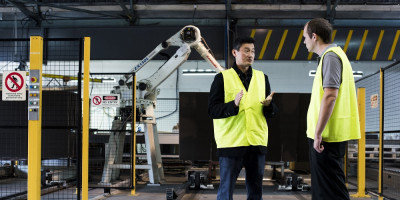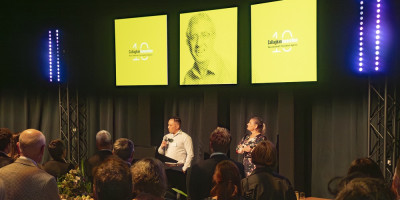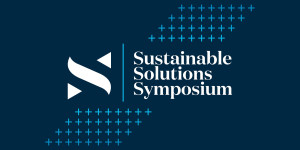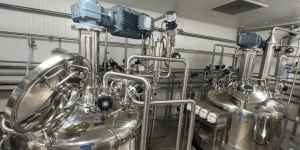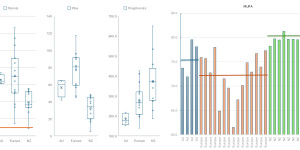Amaroq Therapeutics is a biotech startup developing cutting-edge therapies to fight some of our most prevalent and hard-to-treat cancers.
At a glance
- Biotech startup Amaroq Therapeutics is developing therapies to fight some of the most hard-to-treat and prevalent cancers.
- The underlying science is led by Dr Sarah Diermeier, an Otago University researcher pioneering the investigation of long non-coding RNAs – a class of molecules that regulate certain cell functions – for use in oncology.
- Amaroq Therapeutics recently gained $14 million in investment, including support through Callaghan Innovation’s Technology Incubator Programme, to take its cutting-edge research out of the lab.
Years spent living and working in the US – “where every Uber driver has a startup,” says Dr Sarah Diermeier – piqued the biochemist’s interest in the commercial world.
So, when a chance came to frame up her world-leading research on long non-coding RNAs into a commercial opportunity for an Otago Innovation pitching event, she threw herself into preparations.
“I thought it was a really exciting opportunity because this area of commercialisation was really new to me,” she recalls.
However, with a six-month old baby at the time, Diermeier admits she almost didn’t make the event. But persevering and delivering her pitch not only resulted in her winning the event, but connecting with the lead investors who have now, alongside others, backed her startup, Amaroq Therapeutics, to the tune of $14 million.
Pioneering space
Spun out of Otago University, Amaroq Therapeutics is a biotech startup developing cutting-edge therapies using long non-coding RNAs (or, lncRNAs) to fight some of our most prevalent and hard-to-treat cancers.
A relatively recently discovered class of molecules naturally present in cells, lncRNAs carry out important regulatory functions in cells. Research into how these functions might be exploited for different therapeutic indications is a hot area in science internationally.
In particular, Amaroq Therapeutics’ research team, headed by CSO and Founder Diermeier, has discovered that lncRNA molecules are highly expressed in cancer cells, and removing these slows cancer cells’ growth.
“There aren’t currently any therapies targeting lncRNAs in oncology,” says Diermeier. “We want to be the pioneers in this field, and prove that these molecules are great cancer targets and we can develop them into cancer treatments.”
The startup’s initial focus is on developing therapies to target solid tumours in two cancers that currently have high, unmet clinical needs: triple-negative breast cancer and colorectal cancer. Ultimately, however, it’s hoped the therapeutic platform could be easily repurposed to treat any other type of cancer, and result in significant improvements to the health and wellbeing outcomes of millions of patients, globally.
The science also presents a significant market opportunity. “If you look at just one of the areas of our research – triple-negative breast cancer – acquisition deals being made for any new drug entering this market can be worth hundreds of millions of dollars, while the entire cancer therapeutics industry is worth billions of dollars.”

Amaroq staff and students
First-mover advantage
Originally from Germany, Diermeier has been committed to making a difference for cancer sufferers since she was a teenager, after experiencing the disease’s devastating effects on family members.
“That was the primary motivation for me to become a biochemist and go down this whole pathway,” she explains.
She has been working at the forefront of research into lncRNAs since 2013, when she joined Cold Spring Harbor Laboratory, in the US, to undertake postdoctoral studies under lncRNA expert Professor David Spector.
She established her own research group at the University of Otago when she moved to NZ with her Kiwi husband in 2018. Being named a Rutherford Discovery Fellow that same year, alongside gaining other significant research funding, has helped enable Diermeier to keep at the forefront globally of work targeting lncRNAs for use in oncology.
And spinning out the research into a commercial business has put rocket boosters on the opportunity, establishing a pathway for the research to move out of the lab and into a clinical setting – and ultimately help patients.
“We love investing in world-class science and scientists, and Sarah really is at the top of her game. She’s one of those dream founders to work with,”
- says Duncan Mackintosh, who first met Diermeier at that pitching event in late 2019.
Mackintosh is NZ head of life science investors Brandon Capital, which has led the $14 million investment in Amaroq Therapeutics, and is one of four partners in Callaghan Innovation’s Technology Incubator Programme. Brandon Capital manages the Australia and New Zealand’s largest life science venture capital fund, the Medical Research Commercialisation Fund (MRCF), with over $700m under management.
The incubator programme supports the commercialisation of complex products and technologies, and by partnering with incubators in the programme, deep-tech startups can access Callaghan Innovation pre-incubation grants, as well as repayable grants of $750,000. Alongside co-funding of at least $250,000 from the incubator, the programme offers startups a minimum of $1 million towards commercialisation activity.
Amaroq Therapeutics is the first startup to receive investment from Brandon Capital under the programme, and the total $14 million investment – also supported by NZ Innovation Booster and Cure Kids Ventures – is the largest ever secured by Otago Innovation.
Says Mackintosh: “The Callaghan Innovation preincubation grant allowed us to bring in specialised expertise to evaluate the opportunity that became Amaroq, and help design and test the development plan, which was really valuable.”
“The way the Callaghan Innovation repayable grant is structured supports us to invest early when the risk is very high, and start the conversations that help get exciting companies like Amaroq off the ground.”
The bigger picture
With the investment, Amaroq Therapeutics aims to get its first lead drug to phase I clinical trials, which it hopes to achieve within a couple of years. But while the investment is crucial to fund the expensive process of drug development, the incubation process involves much more, says Diermeier.
Diermeier undertook Brandon Capital’s internship programme to gain a greater understanding of the VC world, for example, and has gained access to experts in areas such as clinical trial design. And Brandon Capital’s ongoing support to set up the business’ infrastructure and commercial pathway allows her to maintain her scientific focus.
Ultimately, she says, the end goal of her career would be to make a drug that improves the wellbeing and survival rates of cancer patients.
“And now I’m closer to that than ever.”



